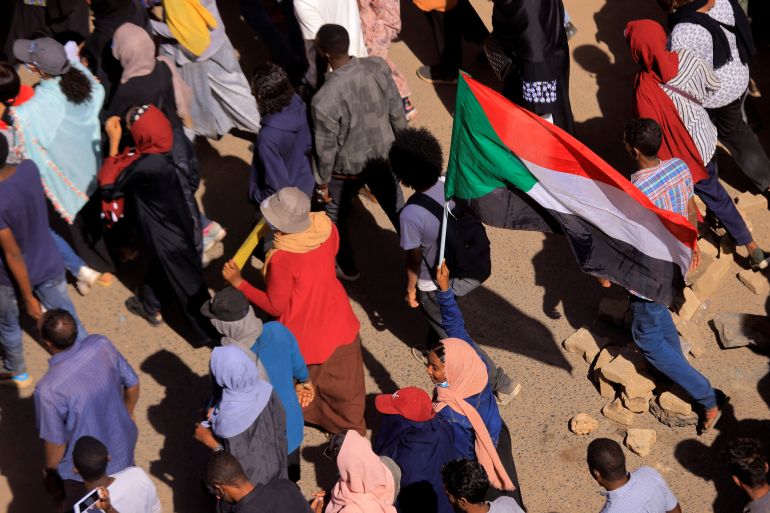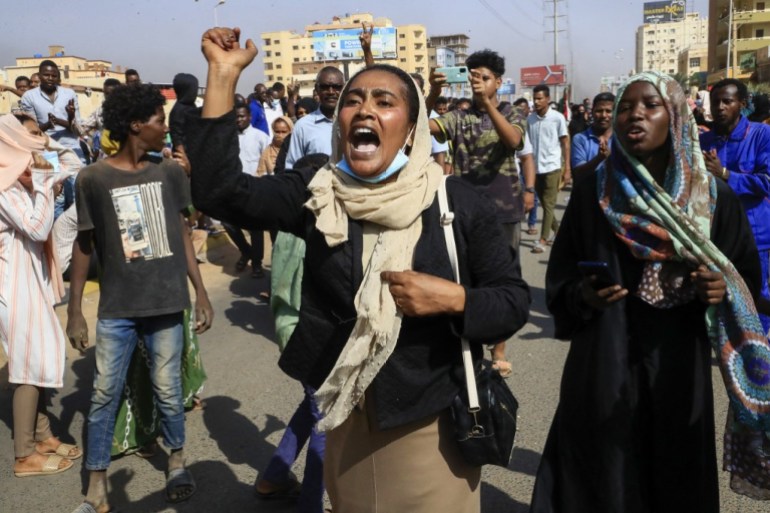Timeline: Sudan’s political situation since al-Bashir’s removal
Sudan’s Prime Minister Abdalla Hamdok resigned in January 2022 after months of political deadlock.

Sudan’s Prime Minister Abdalla Hamdok has announced his resignation amid political deadlock and widespread pro-democracy protests following a military coup that derailed the country’s fragile transition to democratic rule.
Hamdok, a former UN official seen as the civilian face of Sudan’s transitional government, was reinstated as prime minister in November last year as part of an agreement with the military following the October coup.
Keep reading
list of 3 itemsSudan security forces kill two anti-coup protesters, say medics
‘They won’t break us’: Sudanese protesters decry sexual attacks
In that time he had failed to name a Cabinet and his resignation throws Sudan into political uncertainty.
In a televised national address on January 2, Hamdok called for a dialogue to agree on a “national charter” and to “draw a roadmap” to complete the transition to democracy in accordance with the 2019 constitutional document governing the transitional period.
Here is a recap of events in Sudan since anti-government protests broke out:

December 2018: Mass protests
Widespread protests against poverty, corruption and unemployment erupt in the northeast region of Atbara. Within days, these protests had spread to the capital, Khartoum, and demands soon shift to calls for al-Bashir to step down.
Security forces respond with a fierce crackdown that kills dozens.
April 2019: Al-Bashir overthrown
On April 11, 2019, Sudan’s military removed al-Bashir from power, suspended the country’s constitution and closed its borders and airspace. A three-month state of emergency is also imposed.
Al-Bashir, who was in power for nearly 30 years, is replaced by a transitional military government, but thousands of protesters camp in front of the army headquarters, demanding civilian rule.
Talks between the generals and protest leaders break down.
June 2019: Bloody crackdown
Armed men move in on the protest camp on June 3 and dozens are killed in a days-long bloody crackdown.
A feared paramilitary group, that sprang from the notorious militia known as the Rapid Support Forces (RSF), which is accused of war crimes in the 2003 Darfur conflict, is blamed for the violence but rejects allegations it was involved.
August 2019: Power sharing
After the African Union intervenes, civilian and military factions agree to share power in a three-year transition with elections scheduled for 2023. A council of ministers is also formed under Prime Minister Abdalla Hamdok.
On August 17, a “constitutional declaration” is signed and a sovereign council comprised of leading military and civilian figures is formed three days later.
December 2019: Al-Bashir convicted
On December 14, al-Bashir is convicted of corruption and sentenced to two years in a correctional centre.
The toppled leader has long been wanted by the International Criminal Court (ICC) over charges of genocide, war crimes and crimes against humanity in the 2003 Darfur conflict in which 300,000 people were killed.
A Khartoum prosecutor rejects extradition as not “necessary”.
March-June 2020: Unrest spreads
Hamdok survives an assassination attempt on March 9.
In April, inflation skyrockets to 99 percent and higher, with food prices soaring after borders are closed to tackle the coronavirus pandemic.
On June 30, street demonstrations reiterate demands for justice for people killed under al-Bashir and during the protests of recent years.
July 2020: Al-Bashir tried for coup
Al-Bashir goes on trial in Khartoum on July 21 over the 1989 coup that brought him to power.
The government announces it will devalue the currency in a bid to curb black market activity as it struggles with an “economic emergency”.
October 2020: Peace deal
In October, Sudan signs a landmark peace deal with an alliance of rebel groups.
Two key groups refuse to sign and tribes in Sudan’s east also oppose the accord, saying it overlooks them.
Sudan also agrees to normalise ties with Israel in what is seen as a quid pro quo for the United States to remove the country from its State Sponsors of Terrorism list in December.
February 2021: Fragile government
Sudan announces a new cabinet that includes seven ministers from former rebel groups.
Later, Hamdok warns of fractures within the civilian alliance that spearheaded the anti-Bashir protests.
September-October 2021: Military ‘coup’
Protests in eastern Sudan block trade through the key hub of Port Sudan from September into October.
Khartoum announces on September 21 that it has thwarted a coup attempt by civilian and military plotters linked to al-Bashir’s overthrown government.
Protesters take to the streets in Khartoum from October 16 to demand a military government, ostensibly at the behest of a splinter faction of the main civilian protest bloc.
In response, tens of thousands demonstrate on October 21 in support of the country’s transition to a civilian-led democracy.
On Monday, the information ministry says armed forces detain civilian members of the ruling council, ministers in the government, as well as Hamdok after he refused to support the “coup”.
November 2021- Hamdok reinstated
After several mass rallies against the coup, military leaders and Hamdok announce a deal for his reinstatement as PM.
Hamdok says he has returned to prevent further bloodshed and protect economic reforms.
January 2022 – Hamdok resigns
Hamdok announces resignation after failing to name a government amid continuing anti-military protests.